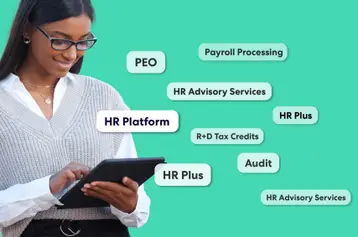PEO Costs: A Complete Decision-Maker's Guide to Evaluating ROI

Table of contents
- 1.What Is a PEO?
- 2.PEO Costs vs. Running Payroll and HR In-house
- 3.Understanding PEO Pricing Models
- 4.What Goes into PEO Costs?
- 5.Setup and implementation costs
- 6.Employee-related costs
- 7.Contractual and exit costs
- 8.Miscellaneous costs
- 9.Cost-Saving Opportunities
- 10.Efficiency improvements
- 11.Risk management value
- 12.Benefits administration
- 13.Making an Informed Decision
The average annual cost for PEO services is $1,395 per employee, according to the NAPEO (National Association of Professional Employer Organizations.
If you’re looking for a comprehensive solution for payroll processing, benefits administration and HR administration for your small business, you might be considering PEO. And for good reason: It's among the best ways to free up time and resources as a small business owner.
But what about PEO costs and the return on investment? The NAPEO says businesses using PEOs see an average ROI of 27%, based on cost savings alone, with average annual savings of $1,775 per employee.
Let's look at the PEO costs business leaders must consider before choosing this solution. This guide provides decision-makers with a detailed breakdown of pricing models, hidden expenses, and research-backed cost comparisons.
What Is a PEO?
A professional employer organization is a firm that provides outsourced human resources management services to businesses.
By working with a PEO, companies can offload certain HR tasks pertaining to payroll processing, employee benefits administration, HR compliance and workers' compensation solutions.
A PEO becomes a co-employer and certain responsibilities are allocated between the business and the PEO. This allows the company to focus on core operations while the PEO handles HR functions.
Beyond administrative relief, PEOs can use their purchasing power to offer smaller businesses access to big company benefits. Through this relationship, businesses can enhance efficiency, reduce certain costs and leverage the PEO's HR expertise.
PEO Costs vs. Running Payroll and HR In-house
According to PEOcompare.com's pricing guide, the estimated average PEO costs 2% to 12% of wages. Of course, actual pricing varies according to company size, industry, geographic location and service requirements.
In addition, comparing the costs of a PEO to in-house payroll and HR costs involves more than crunching stated numbers. It's a matter of value, efficiency and foresight. For example, handling HR in-house might seem cost-effective initially. But hidden expenses may arise, including:
- Software updates
- Continual training
- Potential HR compliance missteps, which can result in penalties and fines
PEOs provide expertise, help with HR compliance and offer access to robust benefit options. With a PEO’s help, businesses can streamline their operations and reduce certain overhead costs, making this solution a wise investment choice for many.
Understanding PEO Pricing Models
There are three standard pricing models.
- Percentage-based pricing. Generally 2-12% of employee wages, with rates typically decreasing as payroll volume increases.
- Flat fee models. A fee is charged per employee.
- Hybrid structures. Some providers combine base administrative fees with payroll percentages or usage-based charges. For example, they might charge a flat insurance fee plus a percentage of payroll for administration and tax-related services.
What Goes into PEO Costs?
The operational costs associated with a PEO cover a range of ongoing expenses, the foremost being administrative fees.
Businesses that use a PEO might also incur technology and platform fees for accessing the PEO's specialized human resources information systems (HRIS) software.
Depending on the chosen services, this could involve costs for consultations or additional services tailored to the company's unique needs. This is why transparency is crucial in the PEO contract—it helps companies anticipate and budget for these operational costs.
Besides the annual fees, there are other costs to consider when you are assessing PEO services.
Setup and implementation costs
PEOs typically charge setup fees for onboarding new businesses. While specific amounts vary widely, businesses should budget for:
- System integration and data migration
- Configuring the PEO's software to align with the company's existing HR tech stack
- Employee onboarding processes
- Policy development and customization
- Initial compliance audits
Businesses might experience other internal costs when starting up with a PEO, including:
- Staff training time
- Process documentation updates
- System testing and validation
- Change management activities
Employee-related costs
When working with a PEO, businesses should expect several employee-related expenditures, the primary one being benefits. These may involve:
- Health, dental and vision insurance.
- Disability coverage.
- Life insurance.
- Employee assistance programs (EAPs).
- Workers' compensation insurance.
- State unemployment insurance.
PEOs may also offer training and development platforms.
Compare PEO-sponsored benefits with existing or alternative packages to measure cost-effectiveness.
Contractual and exit costs
When working with a PEO, businesses should be vigilant about contractual and potential exit costs. Initial requirements may include minimum service durations or commitments.
Exiting a PEO agreement prematurely could generate termination fees, which can be hefty depending on contract terms. Transitioning away from a PEO might also require expenditures to replace the services and systems. While this may not be a cost directly charged by the PEO, it can still affects the budget.
Miscellaneous costs
Engaging with a PEO can involve other, miscellaneous costs, notably from service limitations and change management. Issues arise when the PEO services don't cover specific HR functions. This compels a business to either manage them internally or outsource them elsewhere, incurring additional expenses. That means you must be picky when choosing a PEO. It should align with both your needs and budget.
In terms of management, transitioning to a PEO's system might necessitate employee training sessions and adjustments to existing workflows. The time taken for staff to adapt and any productivity lulls during this phase represent indirect costs. Businesses should factor these and other indirect costs into their budgeting.
Cost-Saving Opportunities
Having reviewed the PEO costs, let's look at the other side of the ROI equation: value. PEOs provide flexibility and scalability. HR outsourcing reduces the need for proportional HR staff increases during growth phases. It also allows for flexible service adjustments without the need for long-term infrastructure investments.
Efficiency improvements
PEOs typically bring greater efficiency to your business operations by providing:
- Automation and streamlining of administrative tasks.
- Self-service portals that reduce the volume of HR inquiries.
- Standardized processes that eliminate redundant activities.
- Data analytics that strengthen SMBs' abilities to incorporate their HR data into strategic planning.
Risk management value
A PEO has shared responsibility with the employer, as the PEO assumes responsibility for employment-related compliance and risks. A PEO's expertise in labor laws enables it to provide services and guidance. It's value in this area includes:
- Compliance expertise helps prevent costly violations.
- Professional liability coverage reduces lawsuit exposure.
- Workplace safety programs can decrease workers' compensation premiums.
Benefits administration
Among businesses with 10-49 employee businesses, 52% of PEO users have a retirement plan, versus 23% in companies that do not use a PEO, according to the NAPEO.
Because of their purchasing power, PEOs can provide small businesses with access to enterprise-level employee benefits. This helps SMBs with recruiting, employee engagement and employee retention.
PEO services and technology means a greatly reduced administrative burden for benefits management. Decision-Making Framework
This chart summarizes the factors that might lead an SMB to consider working with a PEO.
| When PEO Investment May Be Justified | When Alternatives Might Be Considered |
| Small businesses lacking dedicated HR expertise | Large organizations with well-established, efficient HR departments |
| Companies experiencing rapid growth requiring scalability | Organizations with existing cost-effective HR solutions |
| High-risk industries needing specialized compliance support | Companies with complex, non-standard operational requirements |
| Organizations seeking improved employee benefits packages | Highly specialized industries requiring unique, niche expertise |
| Businesses with current HR costs exceeding industry benchmarks | Businesses requiring maximum direct control over HR decisions |
| Companies facing recruitment and retention challenges |
|
Making an Informed Decision
PEO costs represent a strategic investment in business growth and operational efficiency. Research shows that businesses using PEOs achieve 27% ROI from cost savings alone, grow twice as fast, and have significantly lower failure rates
In any cost analysis, business owners must balance quality services with budget constraints. It's not always easy, but some PEOs make it easier than others.
TriNet provides cost-effective solutions that cater to diverse business needs. Beyond cost alone, TriNet underscores value, delivering comprehensive HR solutions that often outperform standalone packages in both cost effectiveness and scope.
Talk with a representative today to learn how this can be a game changer for your business and its people.

TriNet Team
Table of contents
- 1.What Is a PEO?
- 2.PEO Costs vs. Running Payroll and HR In-house
- 3.Understanding PEO Pricing Models
- 4.What Goes into PEO Costs?
- 5.Setup and implementation costs
- 6.Employee-related costs
- 7.Contractual and exit costs
- 8.Miscellaneous costs
- 9.Cost-Saving Opportunities
- 10.Efficiency improvements
- 11.Risk management value
- 12.Benefits administration
- 13.Making an Informed Decision






